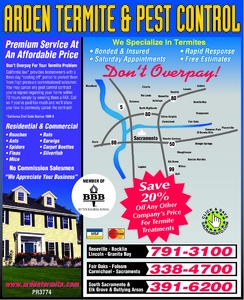Hot Topics:
Flying Insects
If you see flying insects inside your house during the springtime, they are most likely subterranean termites. Call us for a free inspection to identify them. Termites are often look like flying ants.
|
 |
Arden Termite and Pest Control provides a complete line of services for termite inspections and pest control in the greater Sacramento area. 
|
|
|
| Alert: Bed bugs are infesting more and more apartments, hotels, motels and homes in the Sacramento area. If you or your tenants are finding strange insect bites or skin rashes, you may have bed bugs. Call us today to schedule an inspection and if needed, a discreet treatment. Your neighbors will never know! |
|
This is termite swarm season. Winged termites can suddenly appear inside your home. You will often find them on window sills and near other light sources. While they look like flying ants, they are most likely termites here in the Sacramento area. Call us immediately to schedule a free inspection to be sure. Save a sample insect in a plastic baggie. Spray the rest with Raid or some other household pesticide. It won't kill the termite colony but it will slow them down until we can treat your home with Termidor, the most effective guaranteed termite treatment.
If you see mud tubes on your foundation or while remodeling or cleaning the garage, it means you have termites!
No matter how old your home is, where it's located, or how it's constructed, it is susceptible to being attacked by termites. Every year they cause billions of dollars of damage in the United States alone - damage that homeowners insurance won't cover. Chances are you will never see evidence of termites or termite damage until it's too late.
|
 |
We offer a 20% discount off the written estimate of any other pest control company's bid or current contract for subterranean termite treatments. |
 |
We perform termite inspections, treatments and fumigations for the control of subterranean termites, drywood termites, wood boring beetles and other wood destroying pests. |
 |
We perform termite inspections and certifications for real estate transactions. |
 |
We service Sacramento, Placer, El Dorado and Yolo counties. |
 |
We are fully licensed by the California Structural Pest Control Board. |
 |
All of our inspectors and applicators are licensed by the state of California and receive continuing education to stay informed of the latest pest control technology. |
 |
We recommend Termidor for subterranean termite control. |
 |
We recommend Vikane for fumigating houses for drywood termites. |
 |
We recommend Timbor as an alternative to fumigating houses. |
 |
We recommend other local Sacramento pest control companies for the control of ants, bees, carpet beetles, earwigs, fleas, mice, rats, roaches, silverfish, spiders and other household pests. |
|
|
|
Pavement ants feed on insects, meats, seeds, and sweets, but they prefer meats and greases. They are slow-moving insects and are frequently observed in areas where they are prevalent. They forage in trails as far as 30 feet from the nest. Although they are not particularly aggressive, workers can bite and sting.
Control: All cracks and gaps in exterior walls which provide access to voids or interior areas should be sealed. Cracks in slabs and gaps in expansion joints should be filled. All debris from the exterior of the structure and other items on the ground where these ants nest should be removed.
Pavement ants are attracted to and feed on sweet and protein-based baits. Baits should be placed where ant trails have been established and in locations where the ants have been sited. Unless using containerized baits indoors, baits should be placed so they are inaccessible to children and pets. The baits should be checked often for feeding activity and availability.
The most effective control is to follow ant trails to the nests and treat them with a residual insecticide. Exterior nests should be drenched with a liquid formulation. Particular attention should be paid to cracks and expansion joints in slabs, driveways, sidewalks, etc. Metal extension tubes should be used to inject liquid products directly into these sites. If subslab areas require treatment, the use of foam injection or liquid subslab treatments should be considered. Nests in wall voids are more easily treated by aerosol injection or application of a dust formulation. When the nests can not be located, a barrier spray using a microencapsulated or wettable powder formulation should be applied to foundations and the soil immediately adjacent to the building. This is effective in repelling foraging workers and preventing them from reentering the structure.
|
|